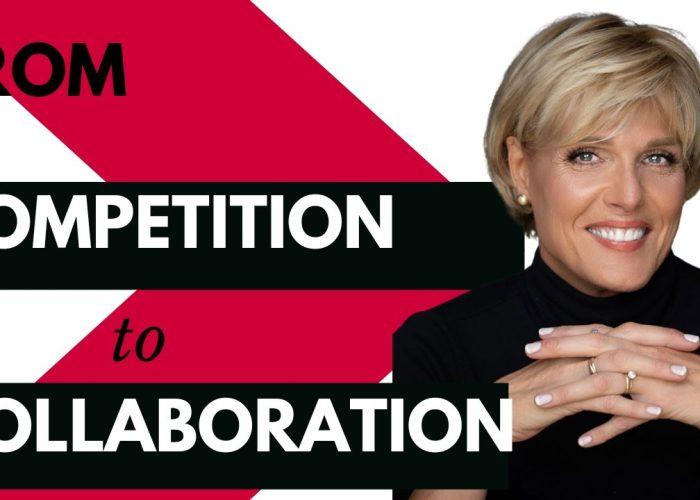A few years ago, a male client of mine asked me to write a letter of support for his application to be one of the “top 40 under 40” professionals in a specific sphere of business. Not long after that, a man I barely knew brazenly asked if I would sponsor him for an exclusive country club membership. Yet another man hit me up within a week of first meeting him to vote for him in a magazine contest to be the “best” in his profession.
I recall being a bit taken aback by the chutzpah of these men, who didn’t apologize or act self-deprecating as they put out their “asks” with confidence. I won’t share who I said “yes” to, but I will share my lasting reaction to this troika of events.
I am rarely, if ever, asked by women to do favors for them that will help them stand out professionally, add valuable knowledge, foster connections that will enable their rise, or “block and tackle” for them in a hostile situation.
Several years ago, Madeleine Albright, Secretary of State in the Obama Administration, famously said, “There is a special place in hell for women who don’t help other women.” Growing up in Washington, D.C., Albright was a familiar face in my life because her twin daughters are close friends. We all watched with awe as Madeleine went from “just a mom” of three strong daughters to the dizzying heights of international power and influence. I don’t know if she had to ask other women for help during her ascent, but I’ve thought about her often since she made that comment during the 2016 U.S Presidential election because I wonder if she was telegraphing to all of us that it is our obligation to support other women, particularly because they may never openly ask for it.
This has all left me wondering: Are men hard-wired to ask others for help, even from those men and women with whom they haven’t yet established a close relationship? Is this why women hang back from cultivating a team approach to getting noticed or ahead?
I polled my female friends when I first became aware of this gender discrepancy. They all agreed on one point: their female friends usually wait for good things to happen to them instead of enlisting female support for their own ambitions, but those same women have no hesitation about asking for recommendations for babysitters and tutors for their children, raising money for a school’s silent auction, or asking where they can find a popular designer on sale. So they have the confidence and chutzpah to ask for important favors and information, but almost never when it comes to aiding their own career.
I decided to do an experiment. I asked some of my closest female friends who have carved out noteworthy careers in such diverse areas as psychology, education, sports management, teaching, entrepreneurship and writing if we could have an agreement. I told them that I wanted to know how I could help them to get noticed in ways that would help them, or that would be beneficial to their success, and added that I hoped I could ask them for the same thing. Their eyes and voices lit up, but first I heard a variety of stories about why this felt like an unlikely fairytale.
“Marissa” is a very successful friend in another country who has been a lawyer, consultant, non-profit leader and entrepreneur. She is also a mother of several children. She is active on social media, and she varies her posts about her professional accolades with snaps from their family trips and highlights from her children’s lives, including their academic honors and first days at school.
At first, Marissa thought it was an anomaly when her proud post about a professional honor got a fraction of the likes that her children’s trip to space camp received, so she began to track what happened when she posted something about her professional life versus her family life. The same thing happened over and over.
She realized that if she wanted her friends and colleagues to be moved to hit “like” or type a congratulatory post, it had to be about her husband, her children, or her leisure activities, but never about her own professional honors or successes. That’s when people went silent.
Once I started the conversation about asking for help, the floodgates opened. Out came requests that many had been afraid to voice: “Can you nominate me for that popular podcast? Can you gather a lot of people to cheer for me when I get on the stage? Can you share my book review on LinkedIn? Can you introduce me to your book agent? Can you tell me how much you earn for a workshop and how I can get a foot in the door at the company where you just spoke?” I responded in kind. “How did you design that course? How much do you pay your social media person? Will you sponsor me for that award?”
It’s been several years since I started trying to change the silence and embarrassment many women feel when they need help or want to be celebrated with my #share222 initiative. It has made me a determined “giver” with the mentality that a rising tide lifts all boats. I’ve learned a lot and been frequently surprised by what I have witnessed, but here are two of my main takeaways that might help other women who want help but don’t know how to get it.
1. The “blowback effect” is alive and well for women who dare to be proud, ambitious or successful, and the worst treatment comes at the hands of other women who see the behavior as anti-female, and thus punishable (“the black sheep effect”).
Although it’s become a common misconception that there is a “confidence gap” between women and men, the truth is that women are penalized when they seek or display power, so too many women go silent when they want help in amplifying, or getting, what they want. This is why a 2016 Washington Post article about how some women in the Obama White House made a point of backing other women’s ideas in high-level meetings hit such a nerve when it was published; what these women agreed to do for each other was so different from what most women experience that the article was commented on and shared hundreds of times.
Antidote: Identify women who “have your back” and have demonstrated a history of “active-constructive responding” (being curious and enthusiastic) to your good news. Tell them that you need and want their help with promoting your work or succeeding in a new and unfamiliar area. Ask how you can help them, too, and make it a regular conversation with concrete outcomes. Create a mastermind group to meet regularly with likeminded peers. Above all, be a generous giver and seed the world with genuine kindness and thoughtfulness; it will reap benefits.
2. Women continue to labor under the misconception that being competent, hard-working, humble and helpful is the path to being recognized. Wrong. As Richard Krevolin shares in his book, “The Hook,” many of the “best” products die early deaths because inventors think the market will reward them for being so excellent. Unfortunately, the products and people who succeed in life are not always the best at what they do; they are the ones who have managed to stand out and become a “hook” in people’s minds because they have associated the successful outcomes people desire with what they offer. If you don’t market yourself successfully as someone whose work is affiliated with what other people want and need, you will go to the graveyard of diligent, regretful doers who were terrific, but never had the critical mass of support to be discovered.
Antidote: Don’t work at being the best “doer;” work at being the person who offers something other people want and need, and make sure the market knows that you exist by following the first antidote.
Although there are many reasons why women don’t seem to ask as aggressively and confidently as men do, it doesn’t mean it is a hardwired behavior that is out of women’s reach. What it does mean, though, is that there need to be new ways to respond to the women who do ask, which is why an organization like SheEOthat has created a community of “radical generosity” of women to female entrepreneurs can make such a difference on a global scale, and why a small “moai” of women who have each other’s backs can create new norms of behavior in your own world.
One of the points that is often made by empowerment speakers, female leaders, and women’s professional networks is that you must promote your successes and toot your own horn because, as one prominent women’s rights organization notes on its website, “If you don’t, who will?”
Here’s the 21st century response to that question that has the power to lift more boats and reduce blowback: “We will.”
Now, we must do it.
Please share this in your networks if you want these ideas to take hold and spread. And if you want to bring me to your organization to speak about this and other leadership topics, visit www.carolinemiller.com or contact Michele Lucia at Michele@Carolinemiller.com . Thank you!
#ihaveyourback #womenempoweringwomen #givers #womensupportingwomen #blowbackeffect #positivepsychology #flourishing #success #womenleaders #womeninleadership #leadership




